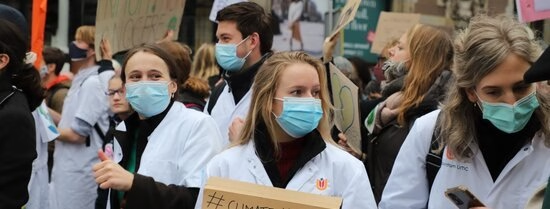Every year on 7 April, World Health Day takes place and this year the theme is "our planet, our health". This calls for attention to the influence of climate change on health. Medical student Juliette Mattijsen is fully engaged in this topic. In 2019, she attended the UN Climate Change Conference in Madrid. In 2021, she went to the climate conference in Glasgow on behalf of the International Federation of Medical Students' Associations.
The difference between the two climate conferences? "Climate change was not much in the news in 2019. As a health community, we found it difficult to connect with the delegations and that's why there was no agreement in the end." In 2021, things were different, Juliette explains: "In 2020, several alarming scientific reports came out, saying that climate action is needed now." This concern was therefore very noticeable at the climate conference in Glasgow. "There was a lot of media, politicians spoke out much more ambitiously and the health community was heard," Juliette said.
"The latest reports on the climate crisis have opened eyes"
The fact that many people are now concerned about the climate is reflected in the climate protests that attract tens of thousands of people, but also in the fact that politicians from the left to the right are addressing it. "Poorer countries are suffering from a climate crisis that they did not cause, for example through floods or droughts and famines that kill many people. High-income countries, such as European countries, owe their prosperity to polluting industrialisation, so it is up to them to become more sustainable," Juliette explains.
Impact of climate change on your health
Climate change affects your health. "We emit more CO2, which makes the average temperature higher and that causes the environment to change. This has an effect on health," says Juliette. "By increasing the temperature there are more heat waves, for example, which can cause heat stress or aggravate cardiovascular diseases. Climate change is also causing more extreme weather, such as forest fires, severe storms and floods, which directly result in more deaths, injuries and displacement. In addition, bacterial contamination of food and water occurs more rapidly in warm weather."
What needs to be done to improve both the climate, and public health?
According to Juliette, an ambitious climate policy is needed: "We are heading for a 2.4 degree warming, while it is crucial to stay below 1.5 degrees. We must emit fewer greenhouse gases as quickly as possible. All sectors are needed for this. In addition, Juliette explains that certain measures are good for both health and climate: we must stop using fossil fuels, we must not waste any more food, we must eat more plant-based food. It is also important that people talk to each other about climate change to inspire each other, to raise awareness about climate and health issues, and to motivate more people to contribute to climate solutions.
"It is actually about how our society can become fairer, healthier and happier"
"The message we bring is very positive"
According to Juliette, the ambitious climate targets are not just negative: "It's not just about consuming or flying less. It is actually about how our society can become fairer, healthier and happier. In doing so, you are not only protecting the future generation, but also the current generation."
Juliette is currently very busy with the topic. For example, she attends climate conferences and has contributed to the development of education on climate and health within Erasmus MC. In addition, during the climate march she drew attention to the impact of climate change on health (more than 190 people and 4 academic hospitals including Erasmus MC joined this 'care block') and wrote a letter to the government about the opportunities to come out of the COVID-19 crisis ‘more green’.
- Related content
- Related links
- Read more about our sustainability vision

